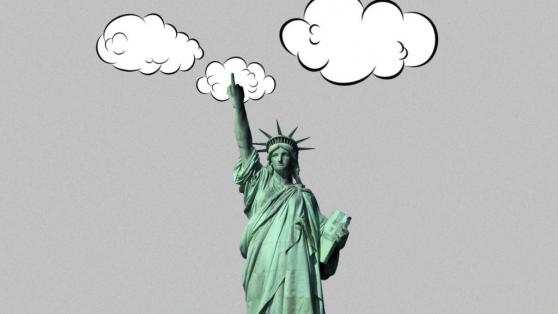“There is a good probability Bitcoin could be outlawed by the United States”, stated the legendary investor Ray Dalio earlier this year.
Billionaire wealth manager suggests there is a chance of the US government restricting Bitcoin if it keeps threatening governmental monopoly on the traditional financial system. What if he’s right? Let’s take a look at how the situation may change if the US government really decided to ban digital gold.
But first things first: why should the US government ban Bitcoin?
The founder of the world’s largest investment firm Bridgewater Associates believes that governments will not easily give up their control over the financial system. “They don’t want other monies to be operating or competing because things can get out of control”, he said.
Ray Dalio sees similarities with the almost century-old situation when the US government restricted gold ownership and trade back in 1934. The law was supposed to protect the currency system of the US in times of the Great Depression when large amounts of gold were moving out of the Federal Reserve.
People, businesses and institutions chose precious metal over paper money and bank bonds that could instantly lose their value.
In the pandemic nowadays, the United States suffers a 4.2% inflation rate. The government prints paper dollars and spends trillions on economic revival plans. Large capitals say the US dollar is losing purchasing power 3x faster than usual.
And boom. Institutional capital starts flowing into the new store of value, the digital gold – Bitcoin.
The paradox is that big players require governmental regulation to get safely involved. And cryptocurrency ban is also a form of regulation, although the most radical one.
Let’s presume what happens if various types of crypto ruling come into force.
Scenario 1: Total ban
Cryptocurrencies become illegal in the US. Bitcoin mining, trading, and transferring them are criminalized and punished.
Institutional investors, who usually are the first ones to know the upcoming political decisions, start to get rid of their crypto possessions while they can. The massive sell-off sparks panic in the cryptocurrency markets. Everybody starts selling simultaneously, Bitcoin’s price crashes in minutes, leading the investors with devastating losses.
Companies with significant BTC holdings face the risk of bankruptcy. They are forced to cut down budgets and staff. Individual investors lose their savings in crypto. The threat of a more significant financial crisis becomes real.
A regulatory ban on cryptos disrupts the largest stablecoin Tether (USDT), which is currently under the CFTC and US Department of Justice investigation for issuing billion-worth amounts of new coins, not fully backed by the US dollar. The general crypto ban affects USDT, which crashed the value of all digital coins as the liquidity across the crypto market is tightly bound.
The Crypto industry dives into chaos. Crypto exchanges shut their digital doors; hundreds of crypto-related start-ups can no longer operate, close down or leave the country, and start operating abroad. The development and innovations in technology and financial services slope down, leaving the US behind others in the technological race.
No more powerful crypto mining farms run day to day using vast amounts of electricity in the US. The planet Earth comes out as the biggest winner.
Scenario 2: Ban on crypto payments
The United States applies the same policy as Turkey and bans cryptocurrency payments. Americans are no longer available to pay for goods and services using cryptos.
Crypto payment service providers shut down or reorient themselves into different business models. The innovations in the crypto-related industry halts, and so does the cryptocurrency mass adoption.
The ban disables transferring funds to cryptocurrency trading platforms via crypto fintech systems. Digital asset exchange witness drops in volumes and liquidity. Meanwhile, the peer-to-peer (P2P) crypto exchanges see user increase. Direct P2P markets operate without intermediaries and are unaffected by governmental regulation.
Since the US is the world’s biggest economy, restrictions on crypto payments lead to cryptocurrency (like Bitcoin in the first place) price drop. Other digital currencies that usually move in sync with bitcoin plummet as well.
The multi-million video gaming, crypto gambling, and the trending NFT (non-fungible tokens) market suffer the most significant losses. All of them rely on cryptocurrency transactions and will suffer harsh consequences if one of the world’s biggest economies decides to restrict crypto payments.
Scenario 3: Supporting the cryptocurrency
The United States implements German-style crypto legislation, where institutional investment funds can invest up to 20% of their holdings into digital currencies. The friendly regulatory environment helps create more trust in digital assets and bring massive new sums into the crypto market.
The allocation of new billions drives the wider digital asset adoption in the world’s largest economy. This means the evolution of infrastructure, more sophisticated institutional-grade custodial solutions, crypto-related investment products, and general cryptocurrency market liquidity growth.
A capital shift from gold, stock, bonds, or real estate and allocation to digital assets drives crypto market value and asset prices to new incredible all-time highs.
On the other hand, the increased number of big capital investors means a higher risk of crypto market destabilization. This becomes possible if large investors decide to conduct large-size trades in the overall small liquidity crypto market.
On the Flipside
- Institutional-grade investments into Bitcoin acknowledge it as an asset class. Bitcoin futures options on futures are traded on the Chicago Mercantile Exchange. Capital gains from Bitcoin are already taxable.
- SEC Chairman Gary Gensler is a previous blockchain, crypto, and fintech professor at MIT, making crypto space expect more friendly crypto future regulations.
- There might still exist future challenges like quantum computing that may strongly affect the future of Bitcoin price.
EMAIL NEWSLETTER
Join to get the flipside of crypto
Upgrade your inbox and get our DailyCoin editors’ picks 1x a week delivered straight to your inbox.
[contact-form-7] You can always unsubscribe with just 1 click.
